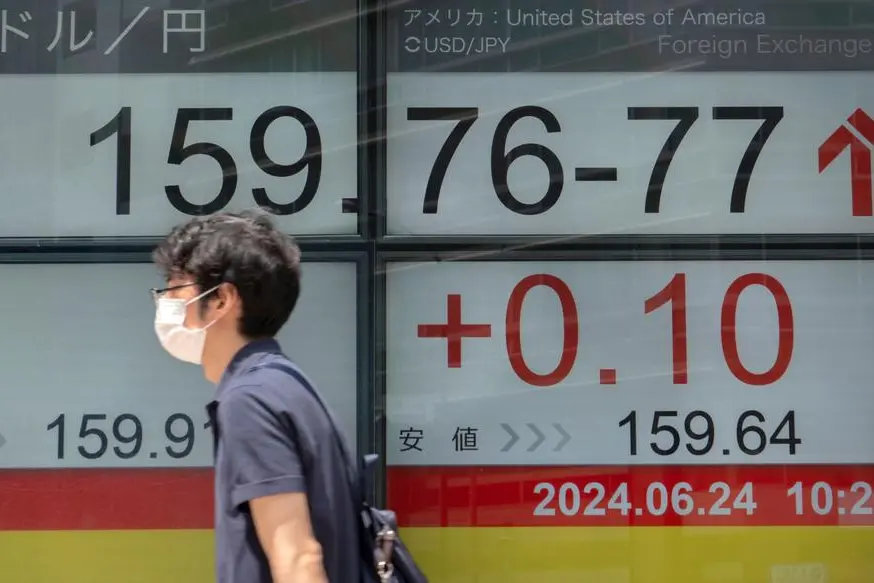PHOTO
The yen, weakened by the Japanese government's easy monetary policy, hit a 38-year low against the dollar on Wednesday, sparking speculation about a new intervention by authorities.
Stocks slid across the globe despite a tech rebound on Tuesday, as investors prepared for the release of crucial US inflation data.
The yen slid as far as 160.61 to the greenback.
Despite sliding through the 160 level, there was no indication that authorities had intervened to support the yen, said market analyst David Morrison at Trade Nation.
"This being the case, it's possible that traders work to push the yen lower in a renewed attempt to test the resolve of the Japanese authorities," he said.
The Asian country's top currency official has said authorities were ready to act 24 hours a day if the unit fell too far.
Billions were pumped in to support the yen when it hit a 34-year low of 160.17 in late April.
Traders are also poring over any comments from the Bank of Japan, which many say has been too cautious in moving away from its ultra-loose monetary policy.
It is tipped to hike interest rates next month and begin winding down its bond purchases that help keep borrowing costs down.
The euro also remained under pressure before weekend elections in France that polls suggest will see big wins for the far-right and left-wing parties pushing President Emmanuel Macron's centrists into third.
The Paris stock market was down 1.0 percent in afternoon deals. Eurozone peer Frankfurt was down 0.5 percent after a key survey showing German consumers are feeling more pessimistic heading into July, rattled by stubborn inflation and economic uncertainty.
The forward-looking survey published by pollsters GfK and the Nuremberg Institute for Market Decisions (NIM) dipped by 0.8 points to minus 21.8 points compared to a month earlier.
Wall Street opened lower, with shares in chipmaker Nvidia rising 0.4 percent.
"What's the hangup? Hard to say exactly, but it is likely a little bit of valuation angst, the bump in the 10-yr note yield to 4.29 percent, and hesitation in front of Micron's earnings report after the close," said market analyst Patrick O'Hare.
On Tuesday, the Nasdaq and S&P 500 had both recovered from a recent sell-off thanks to a bounce in AI chip titan Nvidia from three days of heavy selling.
Investors were also looking ahead to the release Friday of US personal consumption expenditures index -- the Federal Reserve's preferred gauge of inflation -- hoping a softer reading would allow the bank to cut interest rates soon.
The Fed's so-called "dot plot" guide for rates points to one cut before January -- down from three predicted in March -- though there is much debate on whether it will make two, or even none at all.
Equity markets have been well supported this year by an expectation that officials will ease rates after a long-running campaign against sticky inflation.
However, the rally is showing signs of petering out owing to a string of data indicating the US economy and labour market remain strong, while investors are also concerned valuations may have gone too far, particularly among tech firms.
- Key figures around 1330 GMT -
- New York - Dow: DOWN 0.2 percent at 39,017.41 points
- New York - S&P 500: DOWN 0.2 percent at 5,457.83
- New York - Nasdaq: DOWN less than 0.1 percent at 17,702.30
- London - FTSE 100: DOWN 0.4 percent at 8,218.26
- Paris - CAC 40: DOWN 1.0 percent at 7,584.02
- Frankfurt - DAX: UP 0.5 percent at 18,088.79
- EURO STOXX 50: DOWN 0.6 percent at 4,904.31
- Tokyo - Nikkei 225: UP 1.3 percent at 39,667.07 (close)
- Hong Kong - Hang Seng Index: UP 0.1 percent at 18,089.93 (close)
- Shanghai - Composite: UP 0.8 percent at 2,972.53 (close)
- Dollar/yen: UP at 160.58 yen from 159.68 yen on Tuesday
- Euro/dollar: DOWN at $1.0671 from $1.0715
- Euro/pound: UP at 84.48 pence from 84.43 pence
- Pound/dollar: DOWN at $1.2633 from $1.2686
- Brent North Sea Crude: UP less than 0.1 percent at $85.07 per barrel
- West Texas Intermediate: UP less than 0.1 percent at $80.89 per barrel





















